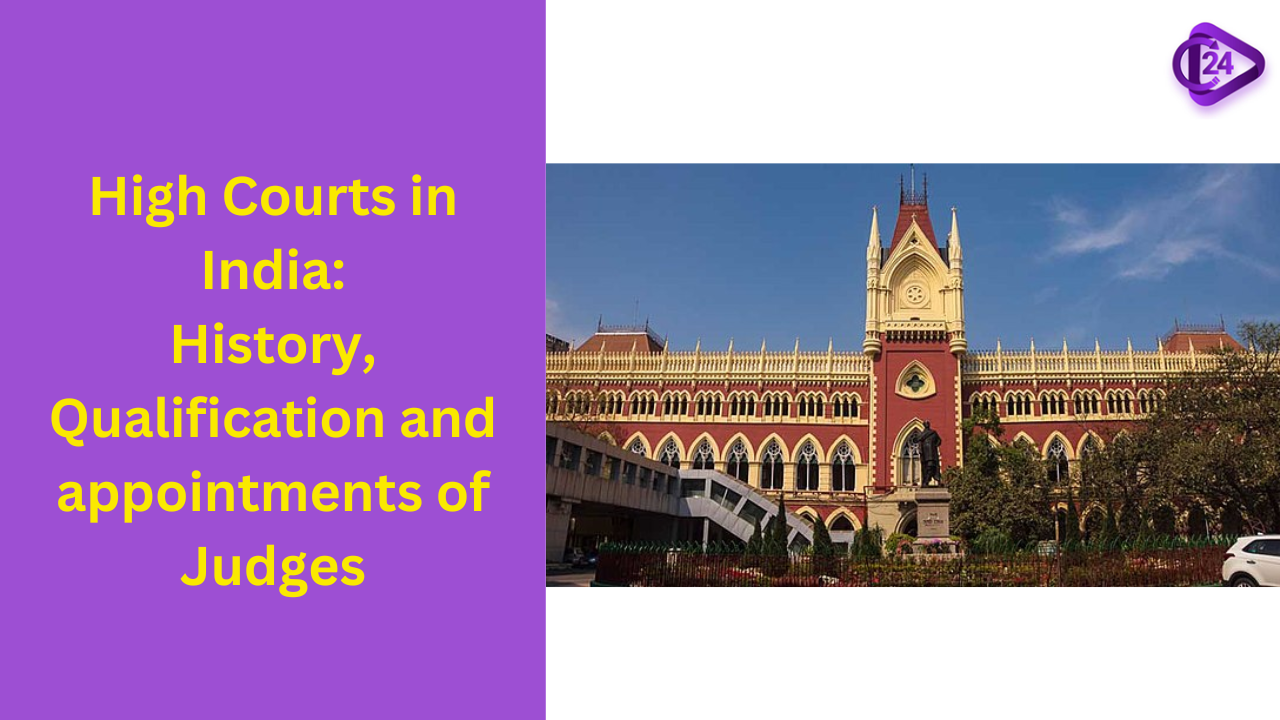Daily Quizzes
Mock Tests
No tests attempted yet.
Select Category
High Courts in India

Static GK is an important segment of General Awareness in any competitive exams. In this article, we will learn about the complete information about the High Courts in India. This article is also important for competitive exams such as SSC, Bank, Defense, etc.
High Courts in India
The government of India is supported by three pillars i.e. the legislature, the executive branch, and the judiciary. In India, the judiciary system is independent. The nature of India's judicial system is based on the hierarchy. In India, the judicial system is mainly based on four layers of order i.e. The Supreme Court of India, The high court of various states, the district courts, and the subordinate courts.
High Courts in India: History
-
In 1858, the law commission recommended establishing the High Courts in place of the Supreme Court in three Presidencies i.e. Madras, Calcutta, and Bombay.
-
On the recommendation of the Law Commission, the Parliament passed the Indian High Courts Act 1861.
-
In May 1862, the Charter of the High Court of Calcutta was ordered and later Madras and Bombay were ordered in June 1862.
-
As a result, the Calcutta High Court became the first High Court of India.
-
Thereafter, the British Government decided to terminate the then-existing Supreme Court and Sadar Adalat and replace it with the High Court.
High Courts in India: Number of High Courts of India
Presently, India has 25 high courts are present in India. In 2019, the Andhra Pradesh High Court and Telangana High Court were established.
High Courts in India: List of High Courts in India
|
List of High Courts in India |
||||
|
S. No. |
Name |
Year |
Territorial |
Seat |
|
|
Kolkata |
1862 |
West Bengal, Andaman & Nicobar Islands |
Kolkata (Bench of Port Blair) |
|
|
Bombay |
1862 |
Maharashtra, Dadar, & Nagar Haveli. Goa, Daman Diu |
Mumbai (Bench at Panaji, Aurangabad and Nagpur) |
|
|
Chennai |
1862 |
Tamil Nadu & Pondicherry |
Chennai (Bench at Madurai) |
|
|
Allahabad |
1866 |
Utter Pradesh |
Allahabad (Bench at Lucknow) |
|
|
Karnataka |
1884 |
Karnataka |
Bengaluru (Bench at Dharwad and Gulbarga) |
|
|
Patna |
1916 |
Bihar |
Patna |
|
|
Jammu & Kashmir |
1928 |
Jammu & Kashmir |
Sri Nagar & Jammu |
|
|
Punjab & Haryana |
1947 |
Punjab, Haryana, Chandigarh |
Chandigarh |
|
|
Guwahati |
1948 |
Assam, Nagaland, Mizoram and Arunachal Pradesh |
Guwahati (Bench at Kohima, Aizawl and Itanagar |
|
|
Orissa |
1948 |
Orissa |
Cuttack |
|
|
Rajasthan |
1949 |
Rajasthan |
Jodhpur ( Bench – Jaipur) |
|
|
Madhya Pradesh |
1956 |
Madhya Pradesh |
Jabalpur (Bench –Indore , Gwalior) |
|
|
Kerala |
1958 |
Kerala & Lakshadweep |
Ernakulum |
|
|
Gujarat |
1960 |
Gujarat |
Ahmedabad |
|
|
Delhi |
1966 |
Delhi |
Delhi |
|
|
Himachal Pradesh |
1966 |
Himachal Pradesh |
Shimla |
|
|
Sikkim |
1975 |
Sikkim |
Gangtok |
|
|
Chhattisgarh |
2000 |
Chhattisgarh |
Bilaspur |
|
|
Uttarakhand |
2000 |
Uttarakhand |
Nainital |
|
|
Jharkhand |
2000 |
Jharkhand |
Ranchi |
|
|
Tripura |
2013 |
Tripura |
Agartala |
|
|
Manipur |
2013 |
Manipur |
Imphal |
|
|
Meghalaya |
2013 |
Meghalaya |
Shillong |
|
|
Andhra Pradesh |
2019 |
Andhra Pradesh |
Amravati |
|
|
Telangana |
2019 |
Telangana |
Hyderabad |
High Courts in India: Appointment of Judges
With the consultation of the Chief Justice of the Supreme Court and the Governor of the State, the President of India appoints the Chief Justice of a High Court. While the other judges in the High courts are appointed by the will of the President, Governor, and the Chief Justice of the High Court.
High Courts in India: Qualifications for the Judges
-
In India, the Chief Justice or other judges of the High Court, are appointed based on:
-
He should be a citizen of India.
-
He should have been an advocate in one or more High Courts in India.
OR
-
A judge for at least 10 years in subordinate courts in India.
High Courts in India: Tenure of Judges
Initially, the retirement age of the Judges of the High Courts was fixed at 60, but later it was raised to 62 in 1963 according to the 15th amendment of the Constitution.
High Courts in India: Salary of High Courts of India
|
High Court Judge Salary |
||
|
Designation |
Past Salary |
After Increment |
|
Chief Justice of the High Court |
90,000 |
2,50,000 |
|
Other Judges of the High Court |
80,000 |
2,25,000 |
FAQs:
1. As of December 2023, how many high courts are present in India?
Ans: As of December 2023, there are 25 High Courts in India.
2. Which is the newly established High Court in India?
Ans: Andhra Pradesh and Telangana High Courts were established in 2019.
Q3. Which state of India does not have its own High Court?
Ans: Arunachal Pradesh, Mizoram, Goa, and Nagaland do not have High Courts.
Q4. Which is the biggest High Court in India?
Ans: Allahabad High Court is the biggest High Court in India.




